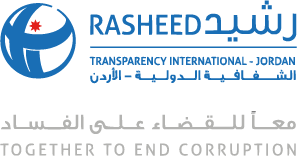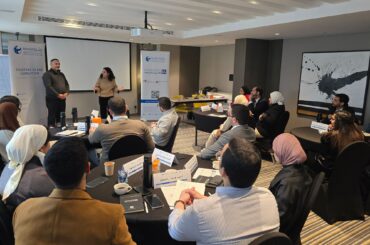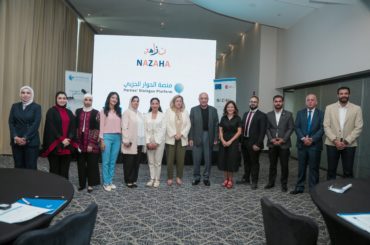- Jordan improved in 3 out of 7 resources in the assessment of the past year , which are:
– The annual World Competitiveness Yearbook issued by the International Institute for Management Development (IMD) contributed a 4-point increase.
– The Varieties of Democracy Project Index contributed a 5-point increase.
– The World Justice Project Rule of Law Index contributed a one-point increase.
This progress is attributed to the national efforts aimed at enhancing digitalization and good governance in the public sector during the past year.
- Jordan maintained the same score in four resources, which are: the Bertelsmann Transformation Index, the Economic Intelligence Unit’s Global Risk Ratings, the Global Insight Country Risk Ratings, and the Political Risk Services Worldwide Governance Indicators.
- The World Economic Forum Index did not participate in the assessment for the current year, and it usually provides high ratings. Therefore, despite the improvement in the scores of the three mentioned resources above, the overall score for the Corruption Perceptions Index for this year has decreased.
- Jordan scored 46 out of 100 on the Corruption Perceptions Index for the year 2023, declining by one point compared to the 2022 score. It dropped two positions in the global ranking, now standing at 63 out of 180 countries and regions.
- Jordan ranked fourth in the Arab region, following the United Arab Emirates, Qatar, and Saudi Arabia.
Rasheed (Transparency International-Jordan), the national chapter of Transparency International, released today the results of the Corruption Perceptions Index for the year 2023. The index was prepared by Transparency International based on assessments from seven different independent international resources for the year 2023. The index worked to evaluate perceptions of corruption in the public sector of countries, according to the perceptions of economic experts and executive officials in the business sector.
The Corruption Perceptions Index is considered a composite index and is referred to as a survey-based survey. It relies on data collected through surveys and specialized perception polls conducted by independent international institutions. These institutions assign scores ranging from 0 (most corrupt) to 100 (most transparent) and then use a specific equation to compile the annual results.
The Corruption Perceptions Index covers a range of topics relevant to the public interest, such as the ability to reduce bribery, activate accountability mechanisms, monitor the use of public funds, reduce embezzlement of public money, and prevent officials from exploiting their positions for personal gain. It assesses the government’s capacity to combat corruption, routine bureaucratic procedures that contribute to the increased likelihood of corruption, favoritism, and nepotism in government appointments, as well as the pursuit of corrupt individuals and the laws regulating such actions. It also addresses the protection of whistleblowers, journalists, and investigators when reporting corruption cases. The index evaluates the ability of civil society to access information of public concern, the civic space, the availability of accountability mechanisms for citizens, and the capacity to achieve justice and enforce the law.
The Corruption Perceptions Index does not measure tax evasion, money laundering, financial secrecy, illicit financial flows, or other forms of private sector corruption.
The Corruption Perceptions Index provides governments with an overview of the effectiveness of their efforts in combating corruption and improving integrity systems. It is also used by investors as a tool to base investment decisions on and assess the risks associated with corruption, determining whether a country is a secure investment destination. Additionally, international institutions use it as a tool to rank countries and assess the effectiveness of their efforts in promoting good governance and achieving justice in the public sector.
In the Arab world, the United Arab Emirates recorded 68 points, Qatar 58, and Saudi Arabia 52 points, which are the highest scores compared to other Arab countries.
While Yemen scored 16 points, Syria scored 13, and Somalia received the lowest score on the index with 11 points.
Globally, Denmark obtained the highest score of 90, followed by Finland with 87, then New Zealand with 85, and Sweden with 82 points.
As part of Transparency International’s theme for the year 2023, “Corruption Undermines Justice,” the President of Transparency International, Francois Valerian, stated: “Corruption will continue to thrive until justice systems can punish wrongdoing and keep governments in check. When justice is bought or politically interfered with, it is the people who suffer. Leaders should fully invest in and guarantee the independence of institutions that uphold the law and tackle corruption. It is time to end impunity for corruption.”
The Executive Director of Transparency International, Mr. Daniel Eriksson, added: “Corruption worsens social injustice and disproportionately affects the most vulnerable. In many countries, obstacles to justice for victims of corruption persist. It is time to break the barriers and ensure people can access justice effectively. Everyone deserves fair and inclusive legal systems where victims’ voices are heard at every stage. Anything else is an affront to justice.”
Based on the results of the Corruption Perceptions Index (CPI), “Rasheed” recommends the following:
- Government commitment to prioritizing the promotion of good governance and combating corruption by embedding a culture and practices of integrity, transparency, accountability, and participation. This involves adopting a comprehensive national integrity system that encompasses all sectors without exception, working to strengthen social equality, justice, equal opportunities, and the rule of law.
- Enhancing the role of supervisory bodies and institutions such as the Anti-Corruption Commission, the Audit Bureau, and others by allocating sufficient funds and resources, reinforcing their administrative and financial independence, supporting capacity-building efforts, and enabling them to develop effective tools for prevention, monitoring, and oversight to keep pace with rapid developments. This also involves expanding their roles and extending oversight to all sectors funded from the general budget, and establishing diverse mechanisms to promote transparency and accountability in the work of law enforcement agencies.
- Completing the alignment of all legislation to comply with the United Nations Convention against Corruption and bilateral agreements.
- Making the results of the follow-up committee on the recommendations of the Audit Bureau’s report regularly and promptly available to the public.
- Ensuring transparent procurement to combat irregularities and conflicts of interest.
- Establishing transparent central registers for foreign companies bidding on public contracts and purchasing real estate.
- Expediting the enactment of a right-to-information law according to international standards and ensuring proactive disclosure of information to the public electronically, in a clear, analyzable, and regular manner.
- Publishing data on public spending and resource distribution across all sectors in a simplified manner to facilitate public participation and accountability based on information and actual figures, thereby enhancing trust between citizens and the state.
- Publishing the information contained in the financial disclosure statements of deputies, public servants in higher positions, government officials, and those responsible for managing public funds, including financial committees’ members, electronically and updating them annually, even in situations emergencies.
- Opening effective communication channels between the government and citizens.
- Monitoring violations by law enforcement agencies and holding violators accountable.
- Including local and international donation funds under the supervision of the Audit Bureau and regulatory authorities.
- Ensuring freedom of opinion, expression, and peaceful assembly, providing a supportive environment for activists and the media. Providing a legislative framework that supports the work of civil society organizations, ensuring their independence, governance, and post-audit, governance of government entities and committees responsible for this sector on the other hand, preventing arbitrary practices, and holding violators accountable.
- Ensuring the development of whistleblower protection regulations, encouraging reporting, and supporting those who have suffered from corruption.
- Prosecuting all corrupt individuals without exception and ensuring they receive fair trials.
- Ensuring the proper implementation of e-government services.
- Adding incentives to encourage state employees to report corruption cases.
- Educating state employees about the importance of adhering to the code of conduct, linking it to incentives, rewards, and bonuses systems.
- Monitoring and controlling violations of the revolving door policy, limiting the movement of individuals between roles as legislators and officials in public positions on one hand, and jobs in the same private or voluntary sector on the other hand. Adopting a suitable transitional period for prevention and adapting appropriate penalties.
- Adopting transparency in government appointments and the need to disclose selection criteria and the results of all stages of appointment.
Rasheed for Integrity and Transparency (Transparency International – Jordan) is a non-profit civil society organization established at the end of 2013. It is the sole national branch of Transparency International in Jordan. The organization aims to strengthen the pillars of good governance based on transparency, integrity, accountability, and the rule of law. It seeks to elevate the levels of integrity and combat corruption in both the public and private sectors, raising awareness across various sectors about the importance of transparency, accountability, and reporting corruption. Additionally, it aims to enhance the legal and executive frameworks of the national integrity system through communication, collaboration, and knowledge exchange with international, regional, and national organizations. The organization works to expand the scope of data and information available to citizens.





